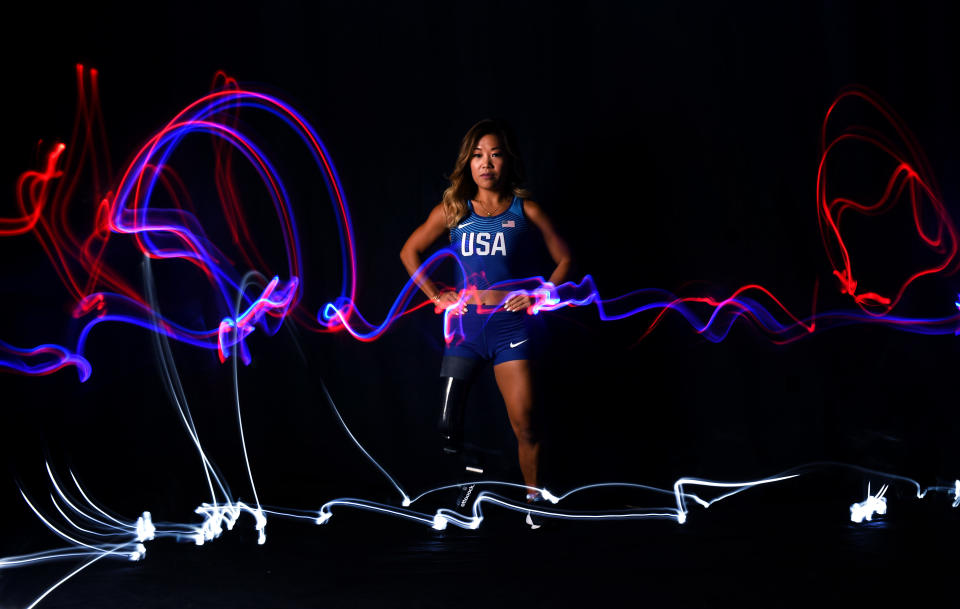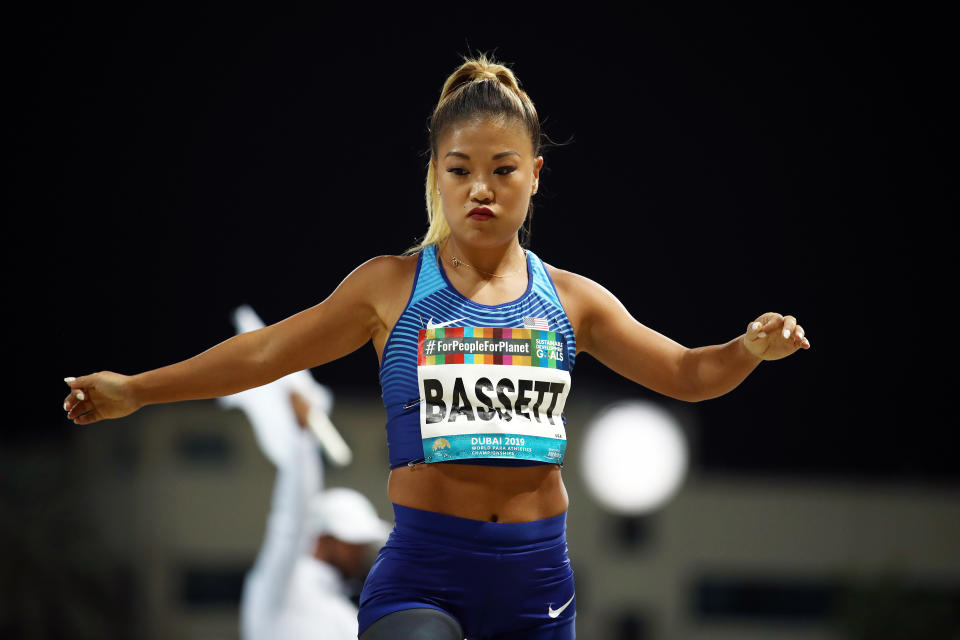Paralympian Scout Bassett: 'I have scars and burns, but can be powerful and just as beautiful'

Editor’s note: This story was originally published on April 8. We are resurfacing to help commemorate the 30th anniversary of the Americans with Disabilities Act.
-----
It was the meltdown of all meltdowns. The kind where words and heaving sobs are impossible to distinguish.
That’s how Scout Bassett remembers it. Even after 17 years, the details of that day in 2003 remain firmly etched in her mind. Bassett, then 14, was attending a Paralympic-style track meet in Orlando, Florida. She’d never set foot on a track, and here she was about to compete in her first race with a brand new prosthetic running leg — in a tank top and shorts.
“Oh my God. I’m going to be exposed.”
The wailing intensified. Bassett had always competed in long pants, and now there was no hiding. This newfangled contraption — this foreign, unfeminine, repulsive apparatus — was suddenly visible for everyone to see.
Bassett continued to protest but, after nearly two hours, realized it was getting her nowhere. She gave in and trudged to the starting line. And then she ran.
“As soon as I started running, the fears didn’t come into my mind,” Bassett said. “You forget about the things that don’t matter … I told myself that day I was never going to be ashamed of who I was or my story.”
Hers is a story of sheer survival and triumph. It begins at an orphanage in China and builds to a new life in America. Then a spot on the track at the 2016 Paralympic Games, and now a push for another at the recently postponed Tokyo Paralympics.
“Her personal story is amazing,” said Bassett’s coach, former hurdler Tonie Campbell, a bronze medalist for Team USA at the 1988 Seoul Olympics. “ … She has so many layers, one after the other … Scout just has this will to survive, to overcome and be recognized and accepted.”
But for Bassett, now 31, acceptance proved elusive almost from the start. She lost her right leg in a chemical fire when she was an infant and was abandoned on the streets of Nanjing, China, before being placed in the government-run Nanjing Children’s Welfare Institute.
For seven years, she never left the orphanage grounds, instead filling her days with manual labor and chores. Physical abuse was disguised as discipline, and, according to Bassett, even something as simple as a warm hug was hard to come by.
There was no education, no freedom, no joy. To this day, Bassett isn’t sure how she survived.
“The entire time I lived there, I couldn’t tell you one positive or happy image that I have,” she said. “It was an incredibly traumatic, horrifying experience. Unthinkable for kids to have to go through.”
Everything changed one afternoon in 1995 when she was adopted by a couple from Harbor Springs, Michigan, a small waterfront town of approximately 1,300 people. Joe and Susi Bassett were in China to take home a baby girl, but after a tour of the orphanage, they were also drawn to two other children — a 5-year-old boy and a 7-year-old girl — and soon became a family of five.
Still, leaving the orphanage proved traumatic for Bassett. She had never heard of America. She’d never been in a car, much less a plane. She’d never even seen a Caucasian person.
“A lot of people think, ‘Oh you must be so excited,’ but it wasn’t that at all,” Bassett recalled. “We didn’t know what was happening, just that we were leaving. We didn’t know it was going to be forever.”
The little girl born Zhu Fuzhi became Scout Bassett, a nod to the main character in her adoptive mother’s favorite book, “To Kill A Mockingbird.”
Bassett admits the otherness she felt as an amputee in China was amplified in her new life. After all, now she was also the new girl who didn’t speak the language and the one who didn’t look like everybody else. She struggled to fit in.
Sports quickly became Bassett’s lifesaver, the thing that kept her going. But athletics also subjected her to additional scrutiny and couldn’t always protect her from cruel kids or narrow-minded adults.
Bassett tried everything from volleyball to soccer, yet she was often left to languish on the bench. Indeed, when Bassett was in eighth grade, she joined the softball team but never played. Never got to roam the outfield, never got a single at-bat. Not one.
“That had a huge effect not just on my self-esteem but how I saw myself,” she said. “Maybe I don’t belong. Maybe I don’t have a place of worth in this society. I just thought people with disabilities were lesser-than.”
Bassett has spent her adult life proving that isn’t so, first to herself and then to the world at large.
Through the support of the Challenged Athletes Foundation, she found solace and success by competing in marathons and triathlons. The Paralympics weren’t on her radar until she received a phone call from U.S. Paralympics High Performance Director Cathy Sellers about a development camp in Southern California in 2010.
“She kept persisting, so I finally said, ‘OK, I’ll come,’” Bassett said. “I loved it. Just the feeling of going so fast.”

Four years ago — just days after finishing fifth in the 100 meters and 10th in the long jump at the Rio Paralympics — Bassett, a UCLA graduate, embarked on what she called “one of the most profound experiences” of her life, returning to the orphanage in China where her journey began.
Bassett handed out soccer balls, jump ropes and candy to the children, the majority of whom had never seen such things. One little girl was particularly curious about her prosthetic.
“How does it go on?” she asked.
Bassett knew removing the leg would horrify the orphanage staff, but she did it anyway.
“Their eyes got super big,” she recalled with a laugh.
As Bassett educated the kids about her leg, a withdrawn 10-year-old boy, whom she’d repeatedly tried and failed to engage, began glancing over out of the corner of his eye. He beckoned Bassett with his little finger, signaling for her to come close. Then something unbelievable happened: He lifted up his pant leg to reveal a prosthetic of his own.
“Just that connection, it was a beautiful moment,” Bassett said. “When you are willing to share who you are, somebody else can share who they are.”
That’s precisely why Bassett decided to take one more leap out of her comfort zone and bare all for the ESPN Body Issue last year. She initially declined, too reluctant to reveal scars from the burns she’d suffered in that chemical fire years ago. Friends convinced her to reconsider.
“So many women struggle with acceptance of their bodies,” Bassett said. “I wanted to shift the narrative about women with disabilities. In the world of disability, we often see male characters portrayed as heroes; they’re celebrated as bionic and cool. … This was just such a great opportunity to show how even though you are a woman with a disability, it isn’t a weakness. I’m not body perfect. I have scars and burns, but can be powerful and strong and just as beautiful.”
Bassett hopes to carry that message to the Tokyo Paralympics — even if she has to wait.
The coronavirus pandemic upended all aspects of everyday life, including the entire sports landscape. When the IOC finally announced its decision to postpone the Tokyo Olympics and Paralympics, Bassett said she didn’t flinch. She knew the moment the NBA suspended its season it was only a matter of time.
“I just knew there is no way they can host these Games on time. It’s not possible,” she said. The IOC “really put us in a difficult spot. I have to train at the same intensity and level; I can’t just sit around and go to the trials and expect to make the team. We were forced to find ways to train, even if it wasn’t in our best interest to do so.”
Bassett and Campbell continued to train at the Chula Vista Elite Athlete Training Center but soon lost the ability to use the weight room. Then they received a cease and desist letter, ordering them to follow shelter-in-place orders that had been instituted throughout California.
“Our training came to a screeching halt,” Campbell said. “It was like, ‘Here’s your workout, good luck doing it and let me know how it turns out.’”
There is a silver lining to the situation, however. Bassett recently started the difficult transition to a new running blade and knee. It’s been a huge adjustment, but one that might lead to a spot on the medal podium in Tokyo with a bit more time.
“When I step on that track, I know I’ve done so much more to prepare myself,” Bassett said. “I know I’ll belong.”
More from Yahoo Sports:

 Yahoo Lifestyle
Yahoo Lifestyle 
